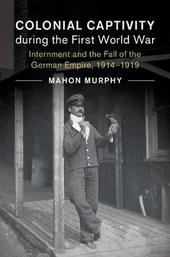
|
Colonial Captivity during the First World War: Internment and the Fall of the German Empire, 1914-1919
Hardback
Main Details
| Title |
Colonial Captivity during the First World War: Internment and the Fall of the German Empire, 1914-1919
|
| Authors and Contributors |
By (author) Mahon Murphy
|
| Series | Studies in the Social and Cultural History of Modern Warfare |
|---|
| Physical Properties |
| Format:Hardback | | Pages:256 | | Dimensions(mm): Height 235,Width 158 |
|
| Category/Genre | First world war |
|---|
| ISBN/Barcode |
9781108418072
|
| Classifications | Dewey:943.0849 |
|---|
| Audience | | Professional & Vocational | |
|---|
| Illustrations |
Worked examples or Exercises; 2 Maps
|
|
Publishing Details |
| Publisher |
Cambridge University Press
|
| Imprint |
Cambridge University Press
|
| Publication Date |
7 September 2017 |
| Publication Country |
United Kingdom
|
Description
With the outbreak of war in 1914, an estimated 30,000 German civilians in African and Asian colonies were violently uprooted and imprisoned. Britain's First World War internment of German settlers seriously challenged the structures that underpinned nineteenth-century imperialism. Through its analysis of this internment, this book highlights the impact that the First World War had on the notion of a common European 'civilising mission' and the image of empire in the early twentieth century. Mahon Murphy examines the effect of the war on a collective European colonial identity, perceptions of internment in the extra-European theatres of war, and empires in transition during war. Policymakers were forced to address difficult questions about the future rule of Germany's colonies and the nature of empire in general. Far from a conflict restricted to European powers, the First World War triggered a worldwide remaking of ideas, institutions and geopolitics.
Author Biography
Mahon Murphy is Research Fellow at the Japan Society for the Promotion of Science at the Graduate School of Law, Kyoto University, Japan.
Reviews'Deeply sourced in British, US, Swiss, German, and Japanese archives, as well as the best modern publications, this study fills a neglected corner of war captivity research. Highly recommended.' G. H. Davis, Choice
|